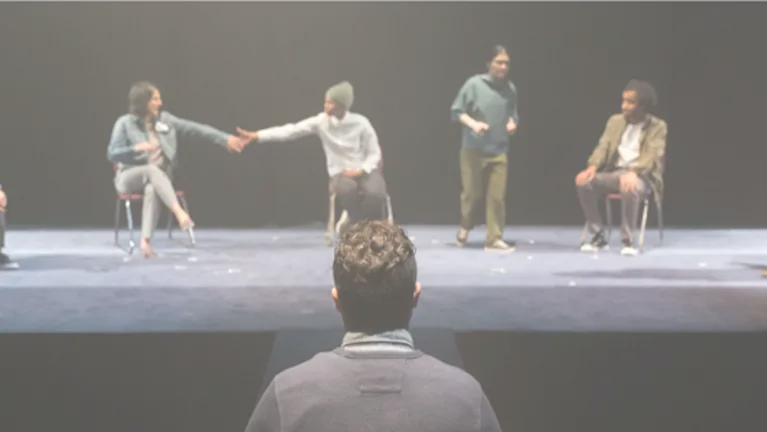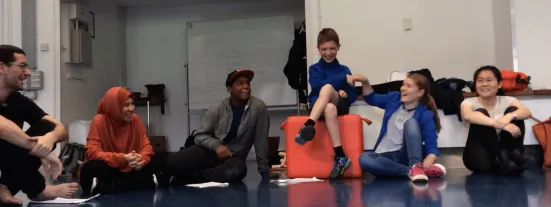Youth, Theatre, Radical Hope and the Ethical Imaginary


Dr. Pigkou Repousi leading suitcase activity in Athens, Greece

"Fist bumping" and exploring differences post-Brexit in Coventry, England
Key Findings
Young people learn best in and from the worlds they inhabit. Curriculum and pedagogies that centre the everyday experiences of young people are most powerful.
The process of imagining community is critical to fostering hope. Trusting this process is critical to caring for the self and others.
Early senses of hope are dominated by relationships with school peers, school teachers, and parents. These relationships provide opportunities to both listen and assert, to care and be cared for. Over time, these relationships change, contributing to reduced optimism about the future.
The ‘ensemble’ or collective process of theatre-making, underscores how struggle and disagreement, difference and solidarity are valuable experiences in an increasingly fractured world. Drama can afford young people a rehearsal space to develop care for self and others.
Research Sites
Professor Wan-Jung Wang
Professor Wang, of Tainan University is a leading expert in the exploration of oral history performance developed in classrooms. She focuses stories on the home and the domestic realm, to challenge the division between the public and the private.
Site Findings
- Students were uneasily pulled between concerns about traditional familial and cultural expectations and their own personal dreams and ambitions.
- Rather than rejecting family or cultural expectations, however, they desired a way to both honour tradition and live out their own dreams.
Dr. Myrto Pigkou-Repousi
Dr. Pigkou-Repousi is an Assistant Professor in Theatre in Education at the Department of Theatre (School of Fine Arts) at the Aristotle University of Thessaloniki. Dr. Pigkou-Repousi's doctoral dissertation charted how ensemble theatre contributed to citizenship education in disadvantaged schools in Greece.
Nikos Govas
Nikos is a theatre/drama pedagogue. He has worked as actor, musician and director with a number of theatre companies and music groups in Greece, England, Germany and Australia. He founded Theatre Lab Company in London (1994) and the Hellenic Theatre/Drama & Education Network in 1998. Nikos is editor of the “Education & Theatre” Journal (Athens, Greece), member of the Editorial Board of the Research in Drama Education: The Journal of Applied Theatre and Performance.
Site Findings
- Young people had never lived outside a culture of ‘crisis’: economic and humanitarian/refugee and were very worried not only about their futures, but their present economic hardships.
- They were also deeply troubled by the refugee crisis and their feelings of helplessness. They have lost faith in political and social systems.
Dr. Kathleen Gallagher
Dr. Gallagher conducted site-specific research in Toronto schools, and hosted The International Collaborators Meetings for the Radical Hope research team at OISE. During this week-long event, collaborators from around the world came together to discuss the work happening in their own sites and the major themes of the ethnographic study.
Andrew Kushnir
Andrew Kushnir is an award-winning playwright, actor, and community arts worker, and the creative director of Project: Humanity (P:H). Andrew guided all sites on the model of Verbatim theatre and produced the playscript for Towards Youth: A Play on Radical Hope.
Site Findings
- Young people expressed great anxiety about: assumptions made about them ‘as a group’, mental health support, tensions of race - especially between racialized young people and the police, and future possibilities.
- They expressed cynicism about mainstream political systems and exhaustion about a ‘post-truth’ world.
Dr. Urvashi Sahni
Dr. Sahni is the founder of Prerna School and works in the area of personal and collective transformation through drama. She studies the scripted rules imposed on with lowest caste girls by home, making the domestic public, as students explore and express the politics of power that limit their lives.
Site Findings
- The young women we worked with were very hopeful about their capacity to resist gender oppression because of the feminist, activist and theatre education they had received.
- For students in Lucknow, school was a haven from pernicious and pervasive conditions of public and domestic violence and economic precarity.
Dr. Rachel King
Dr. King is the Assistant Professor in Creativity, Performance and Education at the Centre for Education Studies, University of Warwick. She examines the ways drama and theatre-based pedagogies can be used to create hospitable and convivial spaces for interaction between multi-ethnic communities.
Site Findings
- Many young people felt at odds with older generations in the UK who voted to leave the EU.
- They expressed frustration about not being able to vote in a referendum that would deeply affect their futures, their work and life prospects, and were very worried about the negative effects of Brexit on their families.